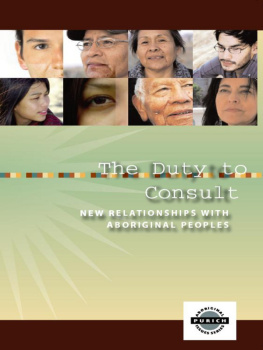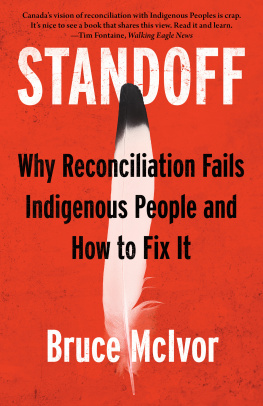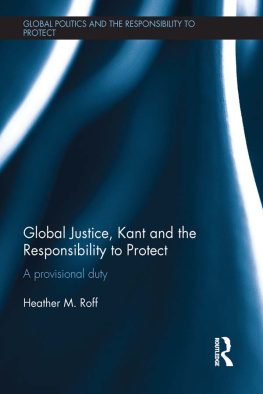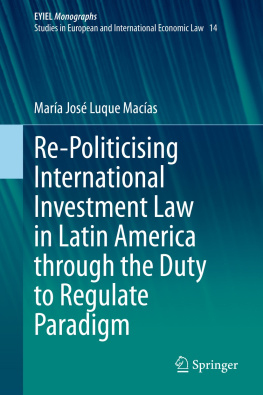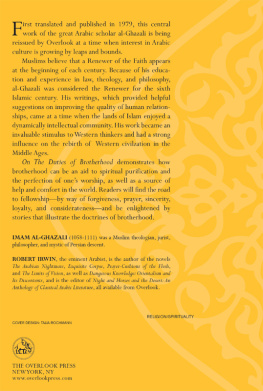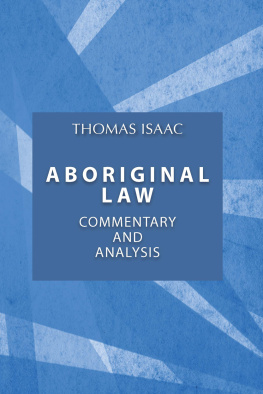
THE DUTY TO CONSULT

THE DUTY TO CONSULT
NEW RELATIONSHIPS WITH ABORIGINAL PEOPLES

DWIGHT G. NEWMAN

Copyright 2009 Dwight G. Newman
All rights reserved. No part of this publication may be reproduced or transmitted in any form or by any means without permission in writing from the publisher, except by a reviewer who may quote brief passages in a review, or in the case of photocopying or other reprographic copying, a license from ACCESS (Canadian Copyright Licensing Agency) in Toronto. All inquiries and orders regarding this publication should be addressed to:
PURICH PUBLISHING LTD.
Box 23032, Market Mall Post Office, Saskatoon, SK, Canada, S7J 5H3
Tel: (306) 373-5311 Fax: (306) 373-5315 Email: purich@sasktel.net
Library and Archives Canada Cataloguing in Publication
Newman, Dwight
The duty to consult : new relationships with Aboriginal peoples / Dwight G. Newman.
(Purichs aboriginal issues series)
Includes index.
ISBN 978-1-895830-37-8
1. Native peoples Legal status, laws, etc. Canada. 2. Native peoples Canada Government relations. 3. Native peoples Canada Claims. 4. Constitutional law Canada Cases. i. Title. ii. Series: Purichs aboriginal issues series
KE7709.N49 2009 342.7108'72 C2009-904810-8
KF8205.N49 2009
Edited, designed, and typeset by Donald Ward.
Cover design by Duncan Campbell.
Index by Ursula Acton.
Purich Publishing gratefully acknowledges the assistance of the Government of Canada through the Book Publishing Industry Development Program and the Government of Saskatchewan through the Creative Economy Entrepreneurial Fund for its publishing program.
Printed on 100 per cent post-consumer, recycled, ancient-forest-friendly paper.
Updates on important developments on the duty to consult will be available on our website: www.purichpublishing.com.
ACKNOWLEDGEMENTS

IT HAS BEEN A DELIGHT TO WORK with Karen Bolstad and Don Purich at Purich Publishing throughout the process on this book. Their enthusiasm and guidance on the project from the outset was helpful, their patience with delays as I faced the full challenges of the project appreciated, and their careful substantive comments on the manuscript valuable. I am honoured to have had this book accepted to join their distinguished line of books on Aboriginal, legal, and western Canadian issues.
I very much appreciate the editorial efforts of Donald Ward, who has done much to make the book more accessible to a wider audience. The book should be read by lawyers, of course, but also by non-lawyers, and if there remain places where the general reader finds remaining tones of the less accessible sorts of legalese, it is despite great efforts on his part. I also thank Ursula Acton for her skilled copy editing and indexing of the book.
The book frankly would not exist without the enormous efforts of Danielle Schweitzer, who worked as my research assistant through a large part of the process. She gathered what no doubt seemed to her endless legal and policy documents, and she carried out some of the interviews and surveys of stakeholders. I thank her for her tireless efforts.
I thank those who spoke with us, responded to written questions, or provided information that helped to flesh out perspectives of stakeholders and be more attentive to concerns beyond the academic context. In addition to a number who asked to remain anonymous, I thank Eric Cline, Pierre Cloutier de Repentigny, Jamie Dickson, Jerry Harvey, Teresa Homik, Jason Madden, Mitch McAdam, Liam Mooney, Andy Popko, Nick Schultz, and Danielle Yeager.
I also thank Amy Jo Scherman, who worked as my research assistant during some final phases of the project and who faced with enthusiasm the rather inglorious task of checking and tracking down citations.
I presented papers related to parts of the book at the University of Toronto Legal Theory Workshop in December 2008, at the Canadian Law and Society Association Midwinter Meeting at Saint Marys University in Halifax in January 2009, and at the Western Canadian Emerging Legal Scholars Workshop at the University of Manitoba in May 2009. I am grateful for the opportunity for feedback on these occasions. For their comments and questions, I thank in particular Natasha Affolder, Annie Bunting, Brenda Gunn, Heather Heavin, Patrick Macklem, Jane McMillan, David Milward, Sophia Moreau, Ronalda Murphy, Debra Parkes, Denise Raume, David Schneiderman, Brian Slattery, Mariana Valverde, and Stephen Waddams. For encouragement and suggestions concerning sources on other occasions, I also thank Paul Chartrand, James (Sakej) Youngblood Henderson, Celeste Hutchinson, Courtney Kirk, and John Whyte.
I thank the Social Sciences and Humanities Research Council (SSHRC) for Standard Research Grant funding that has supported my research program on Theorizing Aboriginal Rights, from which this book is one product.
I thank my spouse, Simonne Horwitz, for her constant encouragement and support.
And, finally, I thank you, the reader, for your readiness to engage in thinking about this complex subject through this book. I welcome any feedback from you as well.
Dwight G. Newman
Saskatoon
July 2009
CONTENTS

RECENT ABORIGINAL LAW DOCTRINE IN CANADA is largely concerned with elaborating the implications of the Aboriginal rights provision in s. 35 of the Constitution Act, 1982. These three cases have set Aboriginal rights in Canada, and Aboriginal/ non-Aboriginal relations, on a fundamentally different course than they were on before. At the same time, they have generated many questions and a great deal of uncertainty.
This book is an attempt to clarify the duty to consult as a constitutional duty, and misunderstandings are widespread. Individual readers may find different paths through the book; I welcome that, although I would suggest that there is an overall narrative flow to the book and I would urge readers to consider that as well.
The book begins from the fact that the Haida Nation trilogy and subsequent cases depart from earlier case law in elaborating the existence of a duty to consult Aboriginal communities potentially affected by government decision-making prior to final proof of an Aboriginal rights or Aboriginal title claim. These cases, along with subsequent lower court decisions and various groups policy making, have shaped the modern form of the duty to consult.
The complex frameworks in which the duty to consult is under discussion have suggested a particular format for this book. In Chapter 1 I will turn to a fuller discussion of the duty to consult trilogy and the key holdings from those three cases thus offering an introduction to the fundamental doctrinal content of the duty to consult before turning to several possible theoretical approaches to understanding the duty to consult, given the main doctrinal features from the first sketch.
Chapters 2 and 3 examine the judicial doctrine of the duty to consult as developed in subsequent lower court case law. Chapter 4 explores the development of duty to consult policies by governments, corporate stakeholders, and Aboriginal communities, arguing that this policy making further fleshes out the law. Chapter 5 draws on international and comparative law to offer some possibilities concerning future development of the duty to consult. The book thus seeks to further understanding of the doctrine on both a principled level and in terms of a more detailed examination of its development in the nearly five years since the
Next page
